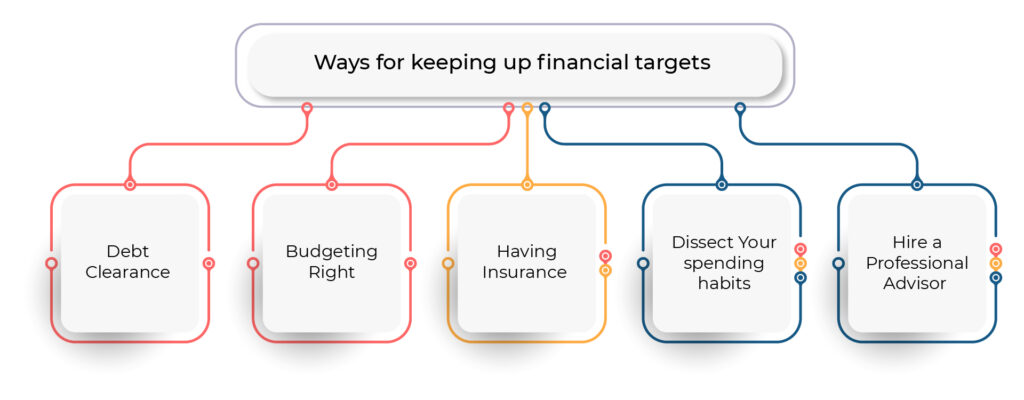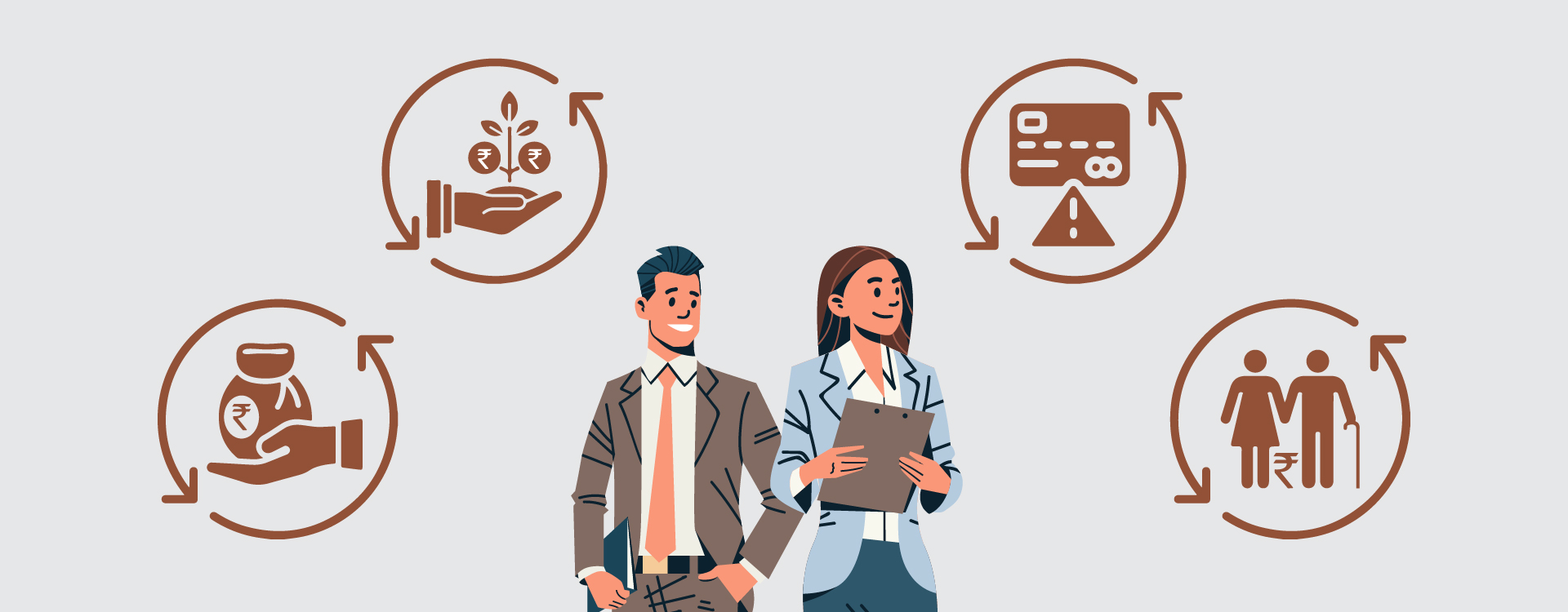Practicing good financial health is as pertinent as maintaining great physical fitness. Developing habits that help an entrepreneur to take care of his own personal wealth will aid him to reach his financial goals and teaches how to save money. For example, investing money in conventional methods such as Fixed Deposits, buying government bonds, mutual funds, buying shares of profitable stable companies, etc. Creating a budget, following a debt management plan, having a fool proof retirement plan are one of the several ways to practice financial well-being.
Following are the ways in which an entrepreneur can keep up with his financial targets:
Hire a professional advisor
To increase your wealth, hire a professional financial planner that will help you make intelligent investment decisions. A financial planner makes you aware of the risks involved in a particular investment, the profitable returns on it. He/she draws a futuristic plan for both long-and short-term investments.
Clear the debt
Debt elimination plans are imperative to reach financial goals. It is a burden that can be handled effectively with thorough planning. For example, clear high interest debts in a short term than the small debts. Systematic planning is important to clear off debt which can act as a hurdle to bigger investment plans. An entrepreneur should get its debt under control, otherwise he will continue paying interests on the debt. So, reducing one’s debts should be a part of one’s financial plan.
‘‘
Developing habits that help an entrepreneur to take care of his own personal wealth will aid him to reach his financial goals and teaches how to save money.
Budgeting right
The beginning to reaching financial goals is setting realistic budgets. Allocate percentage of your income, toward expenditures, and other financial priorities. At least 30% of your money every month should be saved after all the necessary expenses and paying interest debts. Similarly, 30% of the annual income should go into saving investments and retirement planning. Keeping track of income and expenses, daily, monthly, quarterly, half yearly and annually helps the budgeting flow in the direction that’s planned to achieve the financial goal. Have a personal budget set for yourself, to account for expenses, separate personal from business.
Invest in your future – Make retirement plan
Businesses can fall out any time especially the booming start-ups, therefore, an entrepreneur should take calculated risks in his investments- he/she can invest in retirement plans that yield good returns up to the point of 50% when it matures after ten, twenty or thirty years or more. One should invest in at least 2 to 3 such plans varying in the period and number of investments. For example, Rs 30 lakh invested for 10 years, Rs 40 lakh invested for 15 or 20 years, so on and so forth.
Dissect your spending habits
The pandemic has taught us to be frugal, so no point spending on luxury rather spending on items that will yield great benefits monetarily in the future like investing in art. Introspection on spending habits is not a great trait of a successful entrepreneur. Buy nothing on credit to pile on debt, even if you can pay it without any hassle. Future could be uncertain.
Build a contingency fund
A sound emergency fund should cover 6-12 months of personal expenses as well as cover business expenses to sail through bad times when paying debts. Fixed Deposits that yield 9.5 % interest rates could be detrimental at this point, investments in bonds, will help. But investments in mutual funds that are subject to market risk might or might help with a great amount. Similarly, shares that are subject to ups and downs of the stock exchange will help sail through, but the amount will depend on the stock market strength or vulnerability.

Insurance is a must
Health, and term life insurance is something one should take when one is young, so when one gets older and the hospital costs skyrockets, then the insurance will cover the expense. Purchasing the best health insurance is a must. It should cover your family as well. Building a business without insurance is fine but going ahead as you take the ladder upward towards success, you should have sound health insurance. If your family is dependent on you and your business to provide for them, one should have a reliable life insurance plan, this will ensure they are covered and are safe from taking any burden of the business financial loss. Life insurance is important because your net worth is related to your business. Long term disability plan should also be in place in case of any disability that might happen in the unforeseen future.
Takeaway home
It isn’t a bad idea to take some business funds home when the business is in a growth phase. Use that fund to bolster your savings for personal goals. Because your worth is not the same as the company’s valuations. So, count your money when it is at your table. An entrepreneur should only pay himself out of profits not revenue. Don’t cut a big slice of profit as a pay check or bonus, rather invest that money for it to grow.
A line of credit
For an entrepreneur a line of credit is beneficial because it allows cash to be readily available, without tapping into your personal wealth. A line of credit is like a credit card, because once you pay back, the fund replenishes. This gives you freedom to spend money your way without any hurdles. A line of credit is beneficial as it is in conjunction with other financial options available to business owners.
Replenish, recharge
Having a solid business and personal financial plan in place will let you take a break from the busy life. Going for vacations with friends, family and the like will let you refresh your mind, body and soul. Maintaining personal wellbeing is important to run a successful business.
Invest as per risk tolerance
Once your retirement investment is on its way, along with the contingency fund in place, an entrepreneur should invest in a diversified portfolio of assets that is appropriate as per the time horizon and risk involved. Depending on your investment, personal financial goals, one should invest in stocks, mutual funds, gold, real estate that one can withdraw once the price inflates and re-invest in another portfolio for maximum personal finance. But one must be updated on the price fluctuations.
‘‘
An entrepreneur should only pay himself out of profits not revenue. Don’t cut a big slice of profit as a pay check or bonus, rather invest that money for it to grow.
Will making
Making a will before tax implications could leave the entrepreneur’s legal heirs and beneficiaries exposed to tax liabilities that could leave them next to nothing from the total value of assets. So, a solid functional estate planning needs to be done.
Tax benefits
One has to separate personal and business finances for greater tax benefits, and the ability to take advantage of tax deductions is a huge plus for entrepreneurs. Keeping accurate records of personal and business expenses will assist in the event of tax audit, keeping a check will ward off the tax guys.
Fintech, a tool to manage money
Fintech today is transforming the financial management capabilities of entrepreneurs and businesses. There are various personal finance tools and services that are constantly evolving that help manage money better. This trend has been beneficial for businesses, particularly smaller enterprises, making finance automation, data analysis, and flexible financing options within reach.
Manage your personal credit score
An entrepreneur needs to make sure that his personal credit is solid. Paying bills on time, your credit score should be excellent. The percentage of one’s available credit limits that he is borrowing at any given time during the month is the credit utilisation ratio that he needs to pay attention to. If you keep this ratio below 30%, this will help to achieve a better credit score and easier time getting personal loan approved.
Protect personal assets from creditors
Personal assets can be at risk if an entrepreneur is sued for personal wrong doing or as a result of a personal guarantee. However, there are ways to protect personal assets from these types of claims. One can consult with an estate planner or a bankruptcy attorney to prepare a structure to further shield assets from liability of business obligations.
In-sync with trends
An entrepreneur should ensure that all aspects of the plans are regularly reviewed and kept up to date with any regulatory changes that could occur anytime.
Cost effectiveness
Entrepreneurs should use cost benefit analysis before making final decisions when it comes to their personal finance. One should avoid paying more than the expected returns.
Increasing wealth
An entrepreneur’s mind should always keep ticking as to how to maximize personal investment returns. Knowing one’s priority, as to whether to invest the profits or revenue earned from business on a new bond, real estate, or in a company or to buy an expensive car. Maximizing income for the next few years before indulging in luxury should be made clear.
Personal money goals
Having a written financial goal for the targeted month or year-either short or long term to improve personal wealth by a certain amount or percentage gives a direction to your actions. Scattering your wealth in different baskets helps to grow your money as in stocks, real estate, bonds, mutual funds, fixed deposits etc.
Budget spending and plan savings
Budgeting one’s spending and saving is a must. Experts say when you are mindful of both your habits, tracking it will help contribute to wealth growth.
Disseminate risks
With this strategy, entrepreneurs are earning money through multiple businesses and reaping interest incomes through various investments, and with capital gains. In this way, entrepreneurs are diversifying and lowering their personal financial risk. In growing one’s wealth, the entrepreneur needs to consider his objectives, investment timelines, his tolerance to risks involved, in short, choose the most suitable financial plans.
However, note that holding money in stationary form will yield no benefits, investing in mutual funds, fixed deposits, real estate, startups will get interest income, profit percentage.

Protecting personal wealth
Implementing safeguards around wealth that is invested becomes imperative, therefore placing it under an insurance policy that is designed to protect one’s finances – namely, health, life, trauma, and income protection insurance in case of any adverse circumstances
Adopting a frugal lifestyle
Being thrifty is a virtue. Minimizing one’s needs so that he can maximize the amount into investments. Developing a frugal lifestyle is an art one can develop with long term planning, budgeting expenses, finding ways to reduce unnecessary expenses.
Expenses below income
Living below your means is the way one can surplus on savings and cut down on unnecessary expenses. This will allow one to repay debt, save for rainy days, add to the emergency fund or make investment on a lucrative deal.




